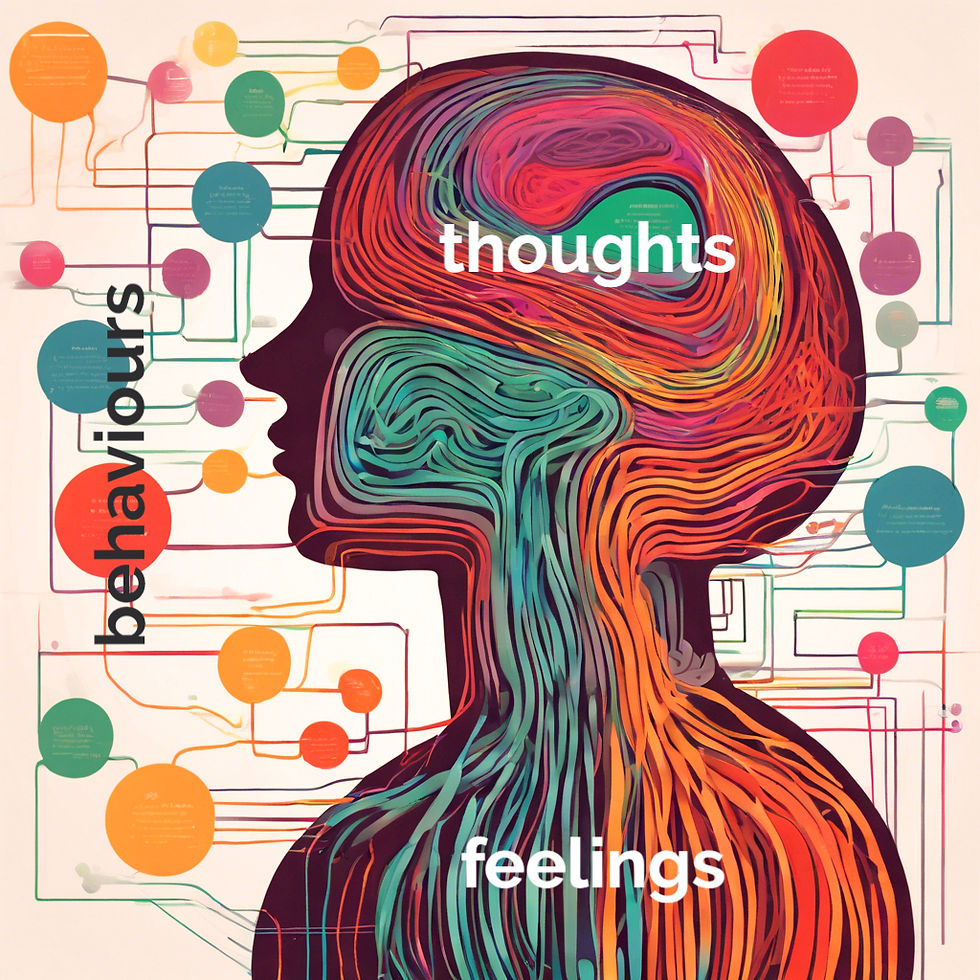Why CBT - Cognitive Behavioural Therapy?
- AndreaTalkingTherapies
- Jun 29, 2024
- 3 min read
Updated: Oct 31, 2024
Introduction to Cognitive Behavioural Therapy (CBT)

Are you facing life's challenges and looking for a way to manage them more effectively? CBT might be the solution for you.
This talking therapy helps you understand the connections between your thoughts, emotions, physical sensations, and actions.
By exploring and addressing these processes, CBT can empower you to tackle overwhelming problems in more manageable ways.
How Does CBT Work?
CBT simplifies complex issues by breaking them down into smaller, manageable parts. It focuses on your current concerns, which may be influenced by past experiences, and seeks to bring about tangible improvements in your daily life.
Through collaborative effort in therapy, CBT promotes a proactive approach to enhancing your mental well-being.
Core Principles of CBT

CBT is based on the idea that psychological issues often stem from our thinking and learned behaviour patterns.
It emphasizes developing coping skills, enabling you to become your own therapist.
By focusing on your current life circumstances, CBT equips you with effective strategies for navigating challenges and improving your overall mental health.
Uses for CBT
Research demonstrates CBT's effectiveness across various mental health conditions, including depression, anxiety disorders, PTSD, addiction, eating disorders, and more.
Moreover, it's utilized in managing long-term health conditions such as chronic pain and irritable bowel syndrome, helping individuals better cope with symptoms.
What to Expect in Your First CBT Sessions
Your initial CBT sessions are about making sure this approach aligns with your needs and comfort level. We'll discuss your needs, the challenges you're facing, and explore how these impact your life. We will create a formulation, a map to understand your experience or your difficulties, the aim is to understand why these are happening to you and what maintains them.

We'll create a tailored treatment plan if CBT seems suitable for you. If CBT doesn't feel right, we can discuss alternative therapeutic approaches.
What Happens During CBT Sessions
CBT sessions typically occur weekly or fortnightly, lasting 50 to 90 minutes. During these sessions, we'll use visual aids and cycles to break down your difficulties into manageable components.
You'll have the opportunity to practice and discuss tools that can help you achieve your goals between sessions. As we proceed, we'll review your progress, address any obstacles, and explore further strategies to support you.
Pros and Cons of CBT
CBT offers structured sessions and practical solutions, often within a relatively short timeframe. The benefits include its effectiveness, practicality, and focus on personal empowerment.
However, it requires your commitment and willingness to confront discomfort and work outside of sessions. While CBT may not address complex family dynamics, it can still be a powerful tool for personal growth. Collaborative work is a key factor, as progress may take time and adjustments may be necessary.
Thank you for taking the time to read this post!
Please share your feedback or ask any questions you might have about Cognitive Behavioural Therapy in the comments below, I'd love to hear from you.
Ready to create virtuous cycles?
CBT offers a pathway to understanding and improving your wellbeing. If you're ready to take the next step towards enhancing your resilience and mental health, reach out today to learn more or schedule a session.
Let's take this journey together for a proactive and practical approach to better mental well-being.



Clear and concise explanation: CBT looks as a very powerful therapy